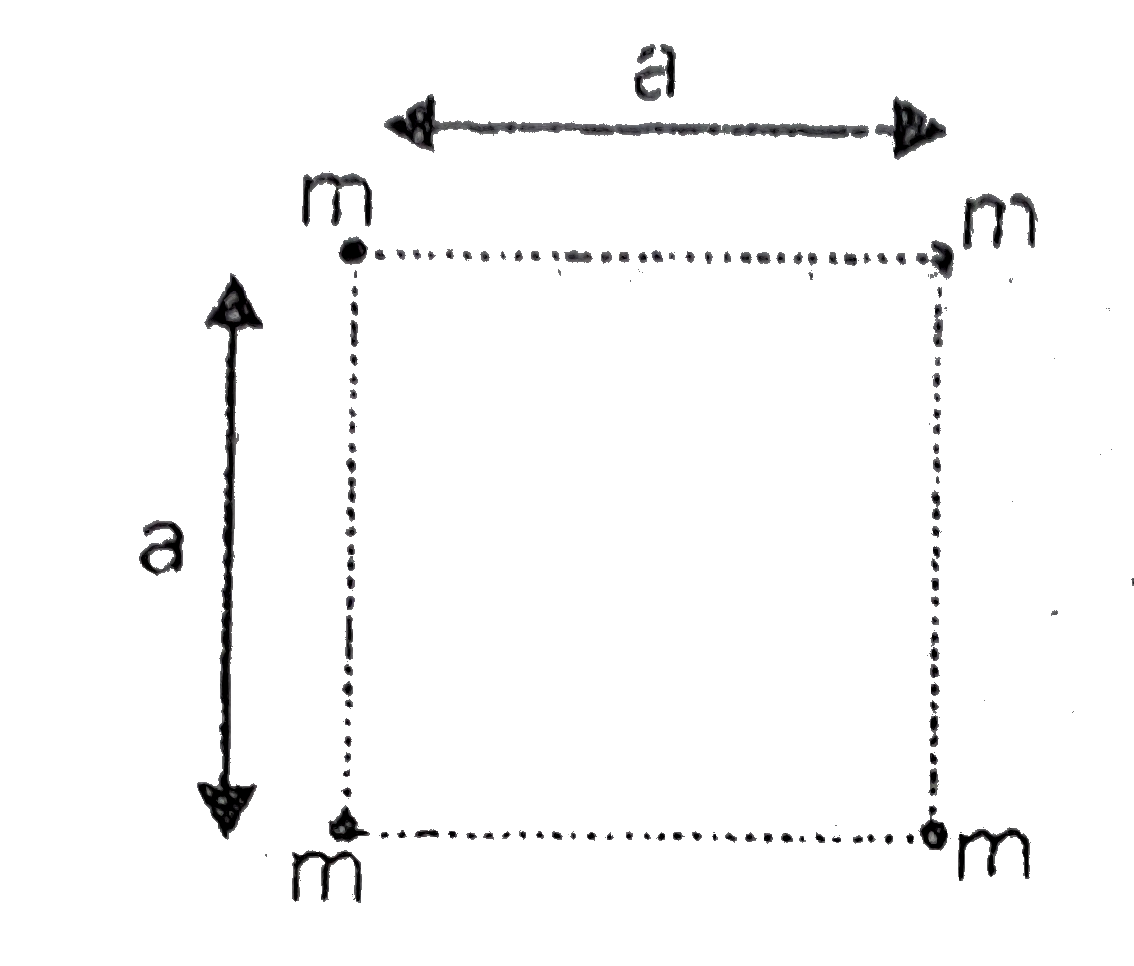Infinite number of masses, each of mass 3 kg are placed along the y-axis at y = 1 m, 3 m, 9 m 27 m ... The magnitude of resultant gravitational potential in terms of gravitatinal constant at the origin (y = 0) is
4.5 G unit
6 G unit
3 G unit
9 unit
The correct Answer is:A
To solve the problem of finding the resultant gravitational potential at the origin due to an infinite number of masses placed along the y-axis, we can follow these steps:
Step 1: Identify the positions of the masses
The masses are placed at positions along the y-axis at y=1m,3m,9m,27m,…. These positions can be expressed as yn=3n−1 for n=1,2,3,….
Step 2: Write the formula for gravitational potential
The gravitational potential V due to a mass m at a distance r is given by the formula:
V=−Gmr
where G is the gravitational constant, m is the mass, and r is the distance from the mass to the point where we are calculating the potential.
Step 3: Calculate the potential at the origin due to each mass
For each mass of 3kg located at yn:
- The distance from the origin (0,0) to the mass at yn is rn=yn=3n−1.
- Therefore, the potential at the origin due to the mass at yn is:
Vn=−G⋅33n−1=−G⋅33n−1=−G⋅31−n
Step 4: Sum the potentials from all masses
The total potential V at the origin is the sum of the potentials due to all the masses:
V=∞∑n=1Vn=∞∑n=1−G⋅31−n
This can be rewritten as:
V=−G⋅3∞∑n=1(13)n−1
Step 5: Recognize the series as a geometric series
The series ∞∑n=1(13)n−1 is a geometric series with the first term a=1 and common ratio r=13. The sum of an infinite geometric series is given by:
S=a1−r=11−13=123=32
Step 6: Substitute back into the potential expression
Now substituting the sum back into the potential expression:
V=−G⋅3⋅32=−9G2
Step 7: Take the magnitude of the potential
Since the question asks for the magnitude of the gravitational potential:
|V|=9G2
Final Answer
Thus, the magnitude of the resultant gravitational potential at the origin is:
9G2
The masses are placed at positions along the y-axis at y=1m,3m,9m,27m,…. These positions can be expressed as yn=3n−1 for n=1,2,3,….
The gravitational potential V due to a mass m at a distance r is given by the formula:
V=−Gmr
where G is the gravitational constant, m is the mass, and r is the distance from the mass to the point where we are calculating the potential.
For each mass of 3kg located at yn:
- The distance from the origin (0,0) to the mass at yn is rn=yn=3n−1.
- Therefore, the potential at the origin due to the mass at yn is:
Vn=−G⋅33n−1=−G⋅33n−1=−G⋅31−n
The total potential V at the origin is the sum of the potentials due to all the masses:
V=∞∑n=1Vn=∞∑n=1−G⋅31−n
This can be rewritten as:
V=−G⋅3∞∑n=1(13)n−1
The series ∞∑n=1(13)n−1 is a geometric series with the first term a=1 and common ratio r=13. The sum of an infinite geometric series is given by:
S=a1−r=11−13=123=32
Now substituting the sum back into the potential expression:
V=−G⋅3⋅32=−9G2
Since the question asks for the magnitude of the gravitational potential:
|V|=9G2
Thus, the magnitude of the resultant gravitational potential at the origin is:
9G2
Topper's Solved these Questions
Similar Questions
Infinite number of masses, each of 1kg, are placed along the x-axis at x=±1m,±2m,±4m,±8m,±16m.. The gravitational of the resultant gravitational potential in term of gravitaitonal constant G at the origin (x=0) is
View SolutionAn infinite number of particles each of mass m are placed on the positive X-axis of 1m,2m,4m,8m,... from the origin. Find the magnitude of the resultant gravitational force on mass m kept at the origin.
View SolutionInfinite number of bodies, each of mass 2kg are situated on X-axis at distance 1m,2m,4m,8m, respectively from the origin, What is the resulting gravitational potential due to this system at the origin ?
View SolutionInfinite number of bodies, each of mass 2kg, are situated on x-axis at distance 1m,2m,4m,8m......... respectively, from the origin. The resulting gravitational potential due to this system at the origin will be
View SolutionInfinite number of bodies, each of mass 2kg, are situated on x-axis at distance 1m,2m,4m,8m......... respectively, from the origin. The resulting gravitational potential the to this system at the origing will be
View SolutionA large number of identical point masses m are placed along x - axis ,at x = 0,1,2,4,……… The magnitude of gravitational force on mass at origin ( x =0) , will be

View SolutionA body of mass m is placed on the earth surface is taken to a height of h=3R, then, change in gravitational potential energy is
View SolutionAn infinite number of charges, each of magnitude q, are placed along x-axis at x = 1m, 2m, 4m, 8m, 16m and so on but the consecutive charges are of opposite sign starting with +q at x = 1m. A point charge q0 , kept at the origin, experiences a force of magnitude :
View SolutionMass particles of 1 kg each are placed along x-axus at x=1,2,4,8,....∞. Then gravitational force o a mass of 3 kg placed at origin is (G= universal gravitation constant) :-
View SolutionFour point masses each of mass 'm' are placed on the corner of square of side 'a' Calculate magnitude of gravitational force experienced each particle
 .
.
View Solution
